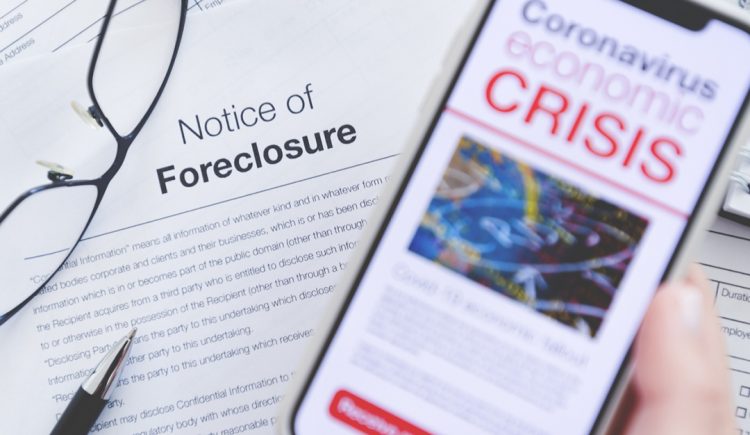The end of federal foreclosure and eviction moratoriums is on the horizon, leaving many wondering, “what’s next?”
On one side, previous reports from Bloomberg predicted a wave of foreclosures that would hit millions of low-income homeowners after forbearance provisions and the foreclosure moratorium ended.
On the other hand, many mom-and-pop landlords and property owners are hopeful that things will return to normal after more than a year of shouldering financial burdens caused by the eviction bans.
Preventing Foreclosures
The pandemic-influenced moratorium on foreclosures will end in June, while millions of homeowners are also slated to exit their yearlong forbearance periods.
While industry experts say they aren’t anticipating waves of foreclosures, that hasn’t wholly stymied concerns over people losing their homes.
“We must not lose sight of the dangers so many consumers still face. Millions of families are at risk of losing their homes to foreclosure in the coming months, even as the country opens back up,” said Dave Uejio, acting director of the Consumer Financial Protection Bureau (CFPB), in an April press release.
At the time, the government agency proposed a set of rule changes aimed at helping prevent avoidable foreclosures as federal foreclosure protections expire in the coming months.
CFPB pushed for servicers to prepare for “a high volume of borrowers exiting forbearance,” with several suggestions to help lenders assist struggling families.
There are roughly 2.23 million homeowners that are in forbearance plans, according to recent estimates by the Mortgage Bankers Association (MBA).
That number has continued to decline in recent months, which is a good sign, according to Marina Walsh, VP of Industry Research, for the MBA.
“The economy is starting to pick up, and we expect the economy, as the vaccine rolls out, to improve, which would also mean a lower unemployment rate,” says Walsh. “As employment gets better, that will be good news in terms of borrowers who want to retain their homes and stay in their homes.”
According to Walsh, borrowers who are still in forbearance in the coming months will likely be able to work out an alternative plan that won’t result in a foreclosure, including loan deferrals, cash for keys or deed in lieu.
New Inventory Amid Market Tailwinds
Brokers expect a slight injection of inventory to the buzzing housing market once the foreclosure ban is lifted, although it won’t solely come from financial hardship.
“It will be interesting to see how it plays out,” says Dan Kruse, president and CEO of CENTURY 21 Affiliated.
According to Kruse, foreclosure activity in the market appears to be an inevitable outcome, albeit not as extreme as analysts predicted back in late 2020.
“I don’t think it’s going to be a massive wave, certainly not like we saw back in 2005 through 2010 when we were dealing with the Great Recession,” Kruse says. “Unlike what we saw in the recession where housing prices started to plummet, we’ve been on a steady run for a good ten years now with median sales price increases certainly over the last two years and over the last 15 months given COVID.”
While borrowers have been able to forgo mortgage payments for the past 14 months, an increase in home equity amid the current housing boom may serve as an opportunity for homeowners to skirt foreclosures, according to Gary Scott, president and CEO of Long & Foster Real Estate.
“It might create quality listings coming on the market,” Scott says. “We just think the market is so hot and inventory is so low that when they have to start making payments, all the people can put their homes on the market and get six or seven offers and sell their homes, pay off their past 14 months of mortgage payments and walk away with money.”
U.S. homeowners with mortgages saw their equity increase by a total of nearly $1.5 trillion at the end of 2020—-a YoY increase of 16.2%—according to the latest CoreLogic Equity Report. The analysis found that average annual gain in equity was $26,300 per homeowner—the largest average equity gain since the third quarter of 2013.
Some property sales may also come from landlords and property owners who have been dealing with financial challenges brought on by the ongoing eviction bans, according to Cami Pinsak, broker/owner of Realty One Group Summit in Ventura, California.
“I think that there may be some landlord fatigue, especially in states that are not so landlord-friendly like California,” Pinsak says. “I think the inventory is still going to stay tight, and there is still going to be a huge demand for rentals.”
Yearlong Burden Ends for Landlords
The past 14 months of eviction bans have been rough for rental property owners and landlords nationwide as they’ve tried to shoulder lost rents during the pandemic.
For California resident Sarah Savko, the federal ban on evictions has led to financial hardships. The income she receives from her rental property in Nevada has gone toward paying for her rent along with traditional financial obligations for the property.
“It has been tough since this transpired,” Savko says. “It’s stressful on me, and it’s also stressful for my family.”
Since the Center for Disease Control and Prevention (CDC) extended the moratorium on evictions in November, Savko says her sole tenant has refused to pay rent even though COVID-19 hasn’t impacted him.
“Before , he was paying his rent perfectly fine and has been a renter with us for quite a while,” Savko says. “Prior to that, there was no problem.”
Thus far, Savko says the tenant owes her $9,879 in back rent while she has used up her savings and assistance from her daughter to stay afloat.
“It’s a very hard thing to lose that money,” Savko says.
Broker/owner Kevin Sears, of Sears Real Estate in Springfield, says Massachusetts had dealt with stricter eviction moratoriums well before the CDC ban began.
“The reality of the eviction moratorium in Massachusetts was that for the first eight months of the pandemic, the only access that property owners and housing providers had to court was in life and death situations,” Sears says.
Sears has managed a six-unit property since the start of 2020.
Before the outbreak of COVID-19, Sears says he had issued a notice to quit to a troublesome tenant in January 2020, which resulted in the tenant withholding their rent payments.
When he and the property owner planned on taking their tenant to court in March, they were halted by the original federal eviction moratorium.
“We had a tenant that was causing all sorts of problems, and because of the problems she was creating, other tenants said, ‘until she goes, we’re not going to pay rent,'” Sears says.
According to Sears, they recently received their eviction to move the tenant out, after getting before a judge in November—before the CDC ban.
The tenant left owing $12,323 plus the court costs, according to Sears.
The owner had also lost roughly $6,000 of rent from his other tenants that withheld rent until the troubling tenant was gone, Sears says.
“Here I have one individual owner who, because of the moratoriums, had his justice delayed and justice denied,” Sears says.
Experts at the National Association of REALTORS® (NAR) have continued to push for the eviction moratorium to be tied to assistance to the housing providers who are losing rent to maintain stability in the marketplace.
Rollout of emergency rental assistance has been rough in several states, which has added to the strain on landlords, according to Christie DeSanctis, director of Federal Banking, Lending and Housing Policy at NAR.
“We’ve already started to hear stories of tenants just walking away, so this rental assistance is absolutely critical because these housing providers aren’t going to be able to get that paid rent anytime soon, and trying to go after tenants who’ve just left the property is incredibly difficult,” says DeSanctis
According to DeSanctis, the organization has more recently pushed for government officials to end the eviction bans so the industry can start working on a path forward for all parties involved.
“Things are increasing and improving around the country, and the quicker that we can get back to normal—where payments are made on time and everyone is whole again—the better,” DeSanctis says.
It appears a U.S. District Court judge for the District of Columbia is in agreement.
According to a recent court order, the judge tried to end the CDC ban on evictions on Wed., May 5 after ruling that it was unlawful. The motion was quickly stymied by an appeal filed by the U.S. Department of Justice (DOJ), however. The court will have a hearing in the next two weeks on the DOJ’s motion, and the temporary stay will remain in effect at least until that decision is issued.
Jordan Grice is RISMedia’s associate content editor. Email him your real estate news to jgrice@rismedia.com.












